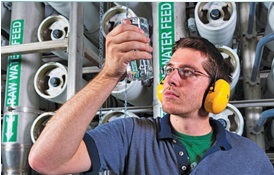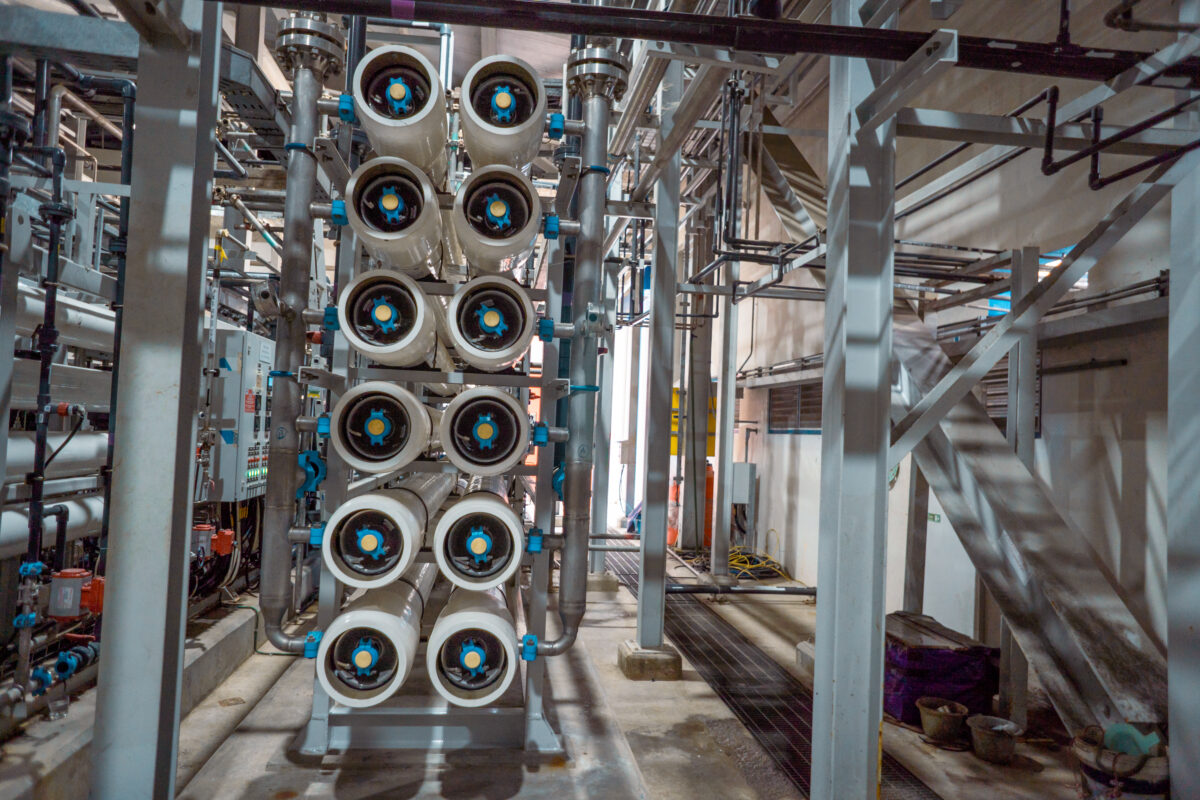In the world of water treatment and industrial processing, the indispensability of reverse osmosis (RO) systems is well-recognized. Functioning under stringent conditions, these systems require materials that are both resilient and efficient. Amalga Composites has risen to prominence in this field, offering innovative materials and manufacturing expertise, particularly for complex RO applications.

The Complex World of RO Systems
RO systems are designed to operate under a variety of demanding conditions. Residential units typically function at 35 to 100 psi, while industrial and desalination applications may require pressures exceeding 800 psi. Optimal operating temperatures are around 25°C, though this can vary based on application. Employed in diverse settings from residential water purifiers to large-scale industrial plants and maritime vessels, each application of RO systems brings its own set of challenges, highlighting the need for materials capable of withstanding a broad spectrum of operational stresses.
Composites: A Versatile and Durable Alternative
Amalga Composites addresses these challenges with bespoke composite materials. The core strength of these composites lies in their customizability. By varying the resin-fabric mix, Amalga is able to craft solutions tailored to the specific demands of different RO systems. This adaptability not only extends to enhancing chemical resistance and durability but also ensures optimal performance and longevity.
Composites can be invaluable in modern water treatment technology given the benefits that these materials bring to reverse osmosis systems:
- Corrosion Resistance: Composites are exceptionally resistant to corrosion, a critical feature for reverse osmosis systems, especially in desalination where components are constantly exposed to saltwater. This resistance extends the lifespan of the system and ensures consistent performance. Traditional materials like metals can corrode over time when exposed to saline environments, leading to leaks and system failures. Composites, by contrast, maintain their integrity, reducing the need for frequent replacements and repairs. This attribute not only enhances operational reliability but also contributes to overall cost savings in the long run.
- Chemical Stability: In reverse osmosis systems, various stages of water treatment involve exposure to different chemical agents. Composites exhibit a high degree of chemical stability, making them resilient against a wide range of chemicals. This feature is particularly important in preventing material degradation, which can compromise system integrity and water purity. Their ability to withstand aggressive chemicals also means that composite-based systems can be used in diverse applications, from industrial wastewater treatment to potable water production. This versatility extends the utility of RO systems and assures long-term performance under varying chemical conditions.
- High Strength-to-Weight Ratio: Composites provide a robust strength-to-weight ratio, which is essential in large-scale industrial applications. They offer the required strength and durability without the added bulk or weight that comes with many traditional materials like steel or iron. This characteristic is particularly beneficial in settings where equipment needs to be moved or installed in challenging locations. The lightweight nature of composites also contributes to reduced transportation and installation costs. Moreover, the structural integrity provided by these materials ensures that the reverse osmosis systems can withstand high-pressure conditions typical in water purification processes.
- Longevity and Durability: Composites are known for their resilience to various environmental factors such as moisture, temperature fluctuations, and UV exposure, significantly extending the service life of reverse osmosis systems. This durability is crucial in reducing the frequency of maintenance and component replacement, thereby lowering operational costs over time. Additionally, the robust nature of composites means that systems can be designed to operate under more demanding conditions without compromising on performance. This long-term reliability is not only cost-effective but also crucial for ensuring continuous water supply in critical applications.
- Customizability: One of the standout features of composites is their customizability. They can be engineered and molded into specific shapes and sizes to meet unique requirements of different reverse osmosis applications. Whether it’s adapting to specific pressure thresholds, accommodating unique flow rates, or fitting into compact spaces, composites offer a level of design flexibility that is hard to achieve with other materials. This ability to tailor the components precisely to the system’s needs leads to more efficient and effective water treatment solutions, catering to a wide range of industrial, commercial, and residential applications.
- Reduced Maintenance Costs: The inherent durability and resistance to wear and tear of composites mean that reverse osmosis systems built with these materials require less maintenance. This reduced need for regular upkeep not only cuts down on the direct costs associated with maintenance activities but also minimizes system downtime. Moreover, the less frequent need for component replacements due to wear and corrosion further contributes to cost savings. The reliability of composite-based systems also means fewer unexpected breakdowns and repairs, leading to more predictable and stable operational costs.
- Improved Efficiency: Composite materials typically have a smoother surface compared to many traditional materials. This smoothness results in reduced friction in water flow within the reverse osmosis system, enhancing the overall efficiency of the water purification process. Efficient flow dynamics within the system can lead to lower energy consumption, as pumps and other components don’t have to work as hard to move water through the system. This improvement in efficiency not only saves energy but also contributes to faster processing times, enabling higher volumes of water to be treated within the same timeframe.
- Thermal Stability: Composites exhibit excellent thermal properties, ensuring stable performance under a range of temperature conditions. This stability is crucial in industrial settings where reverse osmosis systems might be exposed to varying temperatures, either due to environmental factors or as part of the treatment process itself. The ability of composites to maintain their structural integrity and performance characteristics at different temperatures adds to the reliability and versatility of RO systems. This feature is particularly important in ensuring consistent water quality, regardless of external temperature fluctuations.
- Flexibility in Design: The inherent versatility of composite materials allows for innovative design solutions in reverse osmosis systems. Designers and engineers can leverage the malleability and adaptability of composites to create configurations that optimize space, enhance functionality, and even incorporate additional features specific to particular applications. This design flexibility can lead to more compact, efficient, and effective systems, particularly important in applications with space constraints or specific architectural requirements.
- Eco-Friendly: Composites can be more environmentally sustainable compared to some traditional materials, a significant advantage in the context of clean and sustainable water treatment processes. The production and disposal of composites often have a lower environmental impact, and their durability means less frequent replacements and waste. Additionally, the efficiency gains in reverse osmosis systems resulting from the use of composites can lead to reduced energy consumption, further contributing to the overall sustainability of water treatment operations.

Amalga’s Experience with Composites in RO Systems
Amalga Composites has garnered extensive experience in the application of composites within the RO system landscape. Our capabilities encompass the manufacturing of tubes from both fiberglass and carbon fiber, catering to a wide spectrum of industry requirements. In sectors ranging from large-scale industrial manufacturing and marine applications to municipal water treatment and agriculture, our composite solutions have been instrumental in enhancing system efficiency and durability.
Our expertise in composite technology allows us to meet the unique needs of each sector, understanding the nuances of their operational environments. Whether it’s dealing with the high-pressure demands of industrial processes or the corrosive marine environment, our fiberglass and carbon fiber tubes provide unparalleled performance.
Sector-Specific Examples
- Water Treatment and Desalination
- Amalga’s composites have revolutionized the desalination sector. In facilities where the removal of salt from seawater is critical, these composites withstand high saline content and aggressive chemical cleaning regimes, leading to systems that are both more energy-efficient and durable.
- Marine and Naval Industry
- In maritime applications, the demand for lightweight and corrosion-resistant materials is paramount. Amalga’s composite tubing in RO systems on naval vessels and commercial ships enhances water treatment capabilities while significantly reducing maintenance frequency and costs.
- Industrial Manufacturing
- In sectors like pharmaceuticals, food and beverage, and electronics, precision and consistency in water quality are non-negotiable. Amalga’s composite-integrated RO systems deliver reliable, high-quality process water, essential for maintaining stringent industry standards.
- Municipal Water Treatment
- Municipalities have leveraged Amalga’s composites to revamp their water treatment facilities. These composite-enhanced RO systems offer cost-effective, eco-friendly solutions for purifying drinking water and treating wastewater, vital in meeting the needs of expanding urban populations.
- Agriculture
- In agriculture, particularly in regions grappling with water quality issues, Amalga’s solutions facilitate effective water purification. The robustness of these composites under varied conditions has enabled sustainable farming practices, particularly in areas with brackish water.
- Oil and Gas Industry
- The oil and gas industry, where water treatment is essential for processes like hydraulic fracturing, has benefited from the introduction of composite-based RO systems. These systems offer enhanced efficiency in managing water resources and reducing environmental impacts.
Standing at the forefront of material innovation and manufacturing expertise in the RO system space, Amalga Composites is committed to customization, combined with extensive experience and global reach. This positions the company as a leader in providing advanced, durable solutions for a wide range of reverse osmosis applications.
